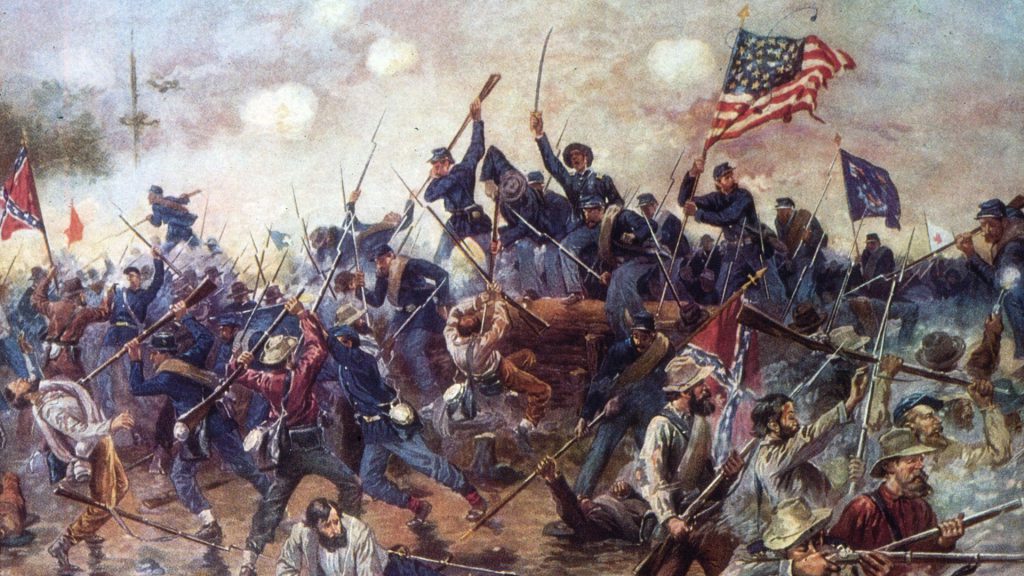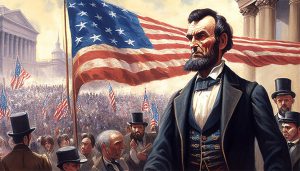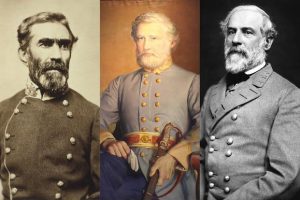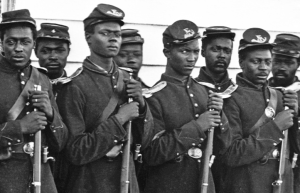
History of The American Civil War
A point of contention in America for the first 70 years or so of its existence was centred around the legal status of slavery in the southern states. The South, which consists of states south of the Ohio River, the Mason-Dixon line, and also including Missouri and Texas, were the agricultural centers of the United States and were ruled over by wealthy plantation owners who benefitted greatly from having African-American slaves working their fields. While slavery was directly contradictory to the basic tenets American society was founded on - liberty and equality - the entrenched Southern supporters weren't willing to let it go easily, and indeed, the slave trade itself was immensely profitable.
The legal issue under which this argument was framed was over the division of powers between state and federal government. Under the Constitution, the federal government is granted certain powers over the state government, and then the remaining powers that the federal government does not control are given to the state. Since the North had a large majority of the population, and since the North was increasingly becoming more and more abolitionist, the South feared that the North, having sovereignty over the less populated South, would outlaw slavery without Southern consent (of which there was little). So the South pushed for secession under the guise of giving more power to the state and local governments, but the issue at its core was slavery.

Abraham Lincoln and the Secession
The straw that broke the camel's back was the election of Abraham Lincoln as president. Lincoln was an abolitionist and was vocally critical of the south's continuing possession of black slaves. He supported legislation to prevent the spread of slavery to other, newly acquired states, but did not have any plans to ban slavery in the south. Fearing the repercussions if he did, several southern states, led by South Carolina, seceded from the Union. South Carolina claimed that the infringement upon states rights was the reason, but, ironically, they claimed that Northern states could not also refuse federal laws by refusing to obey the Fugitive Slave Act, which made it a legal obligation to return escaped slaves to the south. They formed the Confederate States of America, which, while based in the U.S. Constitution, allowed for slavery in all member states.
Not all slave states seceded immediately. Only the deep South seceded at first, until after the attack on the U.S. base at Fort Sumter in South Carolina impelled Abraham Lincoln to call for volunteer armies from all states. Upon doing so, Arkansas, Tennessee, North Carolina, and Virginia seceded from the Union as well. Shortly after Virginia seceded, the portion of the state of Virginia now known as West Virginia seceded from the state of Virginia, but kept slavery legal, thus making it a border state. Missouri, Kentucky, Maryland and Delaware were all slave states, but never actually seceded from the Union, though different factions in these states sent troops to both sides.
Unlike his predecessor, James Buchanan, who believed he could not legally compel states to remain in the Union, Abraham Lincoln quickly put together an Army and implemented a blockade against the South, nearly shutting down their massive cotton industry. The British continued to trade with the South, but had to do so clandestinely.
Confederates - The Fighting

The South had a significantly better military leadership early in the war, led by the brilliant General Robert E. Lee, whereas the Union had trouble in the first few generals finding someone who wasn't an incompetent do-nothing. Coming off of wins at the First and Second Battle at Bull Run, the South invaded the northern border states, nearly making it to Washington D.C., before being turned back at the Battle of Antietam. They invaded again in the Battle of Gettysburg, and the south sustained major losses and was turned back to the South for the last time in July 1863.
Because all of the Generals under Lincoln failed to deliver the coup de grace at proper times, he turned to the leader of the Army in the Western theater, along the Mississippi, Ulysses S. Grant, who was consistently winning major battles in the West. Grant eventually gained complete control of the Mississippi River, thus cutting the South in two and controlling an incredibly important strategic waterway.
When Grant was made General of all of the Union Armies, he put General William Tecumseh Sherman in charge of the Western armies, and together, they began finishing off the South. As Grant pinned down Lee in the North, Sherman marched from Chattanooga to Atlanta, taking the city, and then continuing on his famous "March to the Sea" in Savannah. During this march, his troops led a scorched earth campaign, destroying every crop and Southern asset in sight, in an attempt to wage total psychological warfare on the south's ability to fight.
At around this time, Lincoln was re-elected largely on the waves of the turning tides of the war. Grant finally took out Lee's Army, and in Appomattox, Virginia, Lee surrendered to Grant, thus ending the war, with 620,000 Americans dead.
Just five days later, Lincoln was assassinated by Confederate sympathizer John Wilkes Booth.
Slavery and the War

The south, having as many raw goods as they did, were extremely valuable to other countries than the United States, so Britain and other countries clandestinely continued to trade with the South during the war, defying the Union blockade. This was a major reason for the signing of the Emancipation Proclamation in 1862 and its enactment in 1863. When the war had started, Lincoln and the North claimed that the reason for fighting the war was not to abolish slavery, but to maintain the Union of the United States. In doing so, Lincoln was able to keep the slave states who had not seceded from the union from deciding to join the Confederate cause. The Emancipation Proclamation was first issued as a threat to the South, a threat that, upon the Union taking control of any Confederate slave plantations, the slaves would be freed and be allowed to join the Union Army. This move was more political than abolitionist. First, it threatened the South. Second, it did not end slavery in the border states, as Lincoln feared this might end in a revolt. And third, by aligning the North with the anti-slavery position and making that the central focus of the war, Britain, France, and any other foreign power could not in good conscience support the South, as all of these countries had already banned slavery.
Probably the most lasting impact of the war was the passing of the Thirteenth Amendment, which made slavery completely illegal throughout all of the states. This was adopted at the end of the war, once victory was assured, and was certainly the most noble outcome of the conflict.
Slaves from the South did have the chance to fight in the war, and many did. For black fighters, however, the South made it clear on several occasions that if they were captured, they would either be shot or taken back into slavery, even if they were originally from the North. The South also refused to allow slaves or former slaves to fight for the Confederacy, despite a lack of manpower in the South.
Civil War
Reconstruction and Post-War America
At the end of the war, the focus turned to repairing relations with the south as well as rebuilding. Many in the South refused to cooperate with the North, and tensions continued for years, both in the forms of criminal gangs like the James Gang, or in criminal/terrorist organizations like the Ku Klux Klan.
Part of the problem was a political divide in the North between those who wanted a quick and easy reunification and those who had a slightly more vindictive, radical approach to the south (proposing reparations and renunciations and no votes for former confederates).
In retaliation to the illegalization of slaves, many southern states made active moves to repress the African-American population through restrictive laws which kept them from voting or working in certain spots. These racial divisions continued significantly until the Civil Rights Movement in the 1960's until segregation laws and the policy of "separate but equal" was deemed unconstitutional. To some extent, this racism still lingers today in many parts of the South (and the North, for that matter). Technically, the reconstruction Amendments, amendments 13-15, guaranteed freedom to all, citizenship to those born in the United States, and civil and voting rights for all, respectively.

